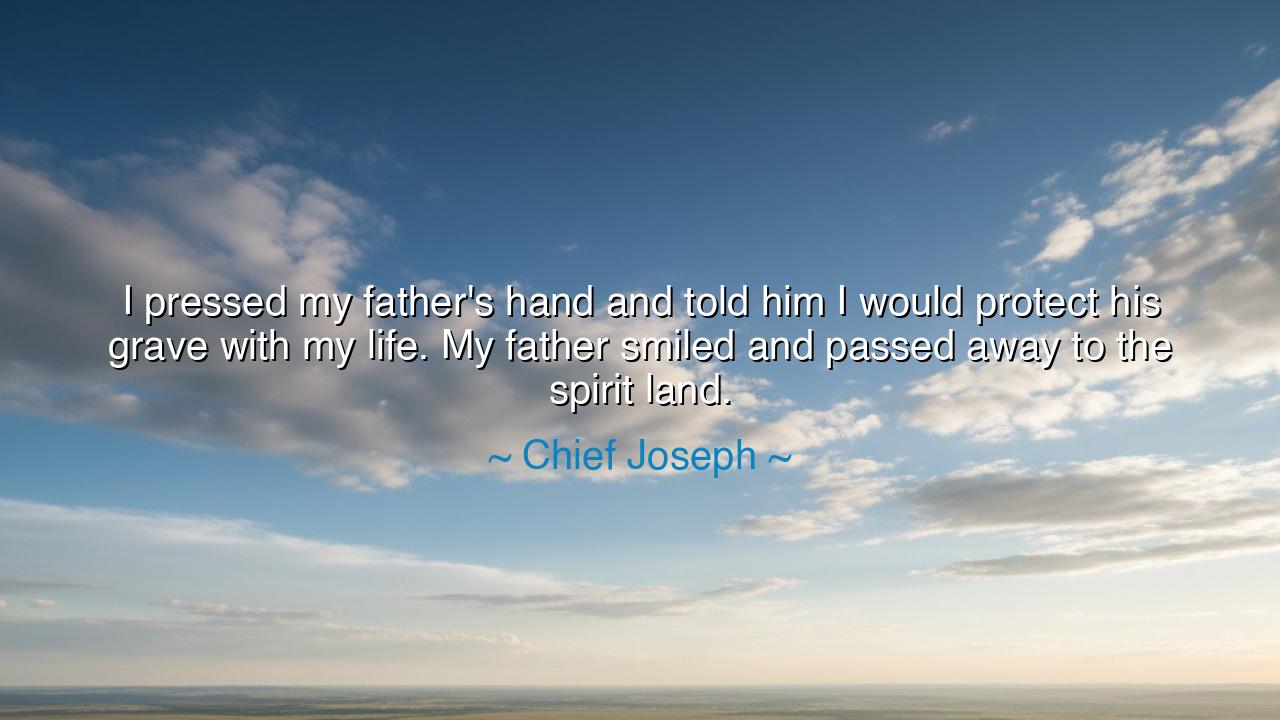
I pressed my father's hand and told him I would protect his grave
I pressed my father's hand and told him I would protect his grave with my life. My father smiled and passed away to the spirit land.






Hear these words, O children of the earth, and let them echo through the valleys of memory: “I pressed my father’s hand and told him I would protect his grave with my life. My father smiled and passed away to the spirit land.” Thus spoke Chief Joseph, the noble leader of the Nez Perce people — a man of deep honor, sorrow, and unbroken spirit. His words are not merely a farewell between father and son; they are a sacred vow, a torch passed from one generation to the next, blazing with duty, love, and reverence for the ancestors. Within this moment of quiet grief lies the eternal truth that heritage, loyalty, and honor bind the living to the dead, the past to the future.
The origin of this saying reaches back to the final days of Chief Joseph’s father, known as Old Joseph, who had resisted the encroachment of settlers upon their ancestral lands in the Wallowa Valley. On his deathbed, the elder charged his son with a solemn command: Never sell the bones of your father and mother. To the Nez Perce, the land was not property but spirit — alive with the presence of their ancestors. When the father died, young Joseph pressed his hand and made the sacred vow that would define his life: to guard the land where his father’s body rested, to protect it against all who sought to claim it. Thus, these words are born not from sentiment, but from a covenant — one sealed by love, loyalty, and the eternal bond between man and his homeland.
When Chief Joseph spoke of the spirit land, he did not speak of death as an ending, but as a transformation. In the wisdom of his people, the soul journeys beyond the veil to dwell among the ancestors, watching over the living. His father’s passing smile was not one of sorrow, but of peace — the peace that comes when a man knows his legacy will be honored. Yet, that vow became both a blessing and a burden, for in keeping it, Joseph would one day lead his people through a tragic odyssey — the long flight toward freedom known as the Nez Perce War of 1877. When the U.S. government forced his tribe to abandon their homeland, Joseph remembered his father’s words and refused surrender until all hope was spent. He protected his father’s grave not merely with his life, but with the life of his people.
This quote, then, is more than filial devotion — it is the living heart of duty. It tells us that love for one’s father, one’s ancestors, is not expressed in words alone but in the courage to uphold their values, to defend their memory even when the world turns hostile. The grave here is symbolic of all that is sacred — the soil of one’s birth, the truth of one’s heritage, the faith that sustains a people. To protect it is to stand against forgetting, against the forces that seek to erase identity for the sake of comfort or conquest. Chief Joseph’s vow became a cry for his people’s survival, and his life became a song of both resistance and grace.
Think, too, of the many throughout history who have sworn similar oaths of devotion. When Leonidas of Sparta led his three hundred warriors to Thermopylae, he too was protecting the graves of his fathers — the freedom and honor of his homeland. When Mahatma Gandhi refused to bow to imperial power, he was guarding not a tomb but a living heritage — the dignity of his people and the spirit of India’s ancestors. Such men understood, as Chief Joseph did, that to betray the memory of one’s forebears is to betray the soul itself.
There is a deep lesson here for all who live in the modern age, where roots grow shallow and loyalty is often fleeting. Remember this: you are the continuation of those who came before you. The strength in your blood, the wisdom in your bones, the stories in your heart — all are gifts from your ancestors. To live honorably is to keep faith with them; to forget them is to wander without purpose. Guard, therefore, the graves of your fathers — not only in stone, but in spirit. Protect their legacy with your actions, their memory with your integrity, their dreams with your courage.
And so, let Chief Joseph’s words become a prayer for every generation: that we may live not for comfort alone, but for honor; not for possession, but for principle; not for ourselves, but for those whose lives gave us life. When the day comes that we, too, pass into the spirit land, may our children take our hands as Joseph did, and may we smile — knowing that they, too, will guard the sacred fire we have left burning.
For this is the way of the wise: to live with reverence, to love with duty, and to die with peace. In the handclasp of father and son, the mortal and the divine are joined — and through that vow, the soul of a people endures forever.






AAdministratorAdministrator
Welcome, honored guests. Please leave a comment, we will respond soon